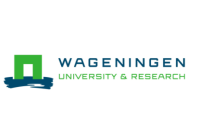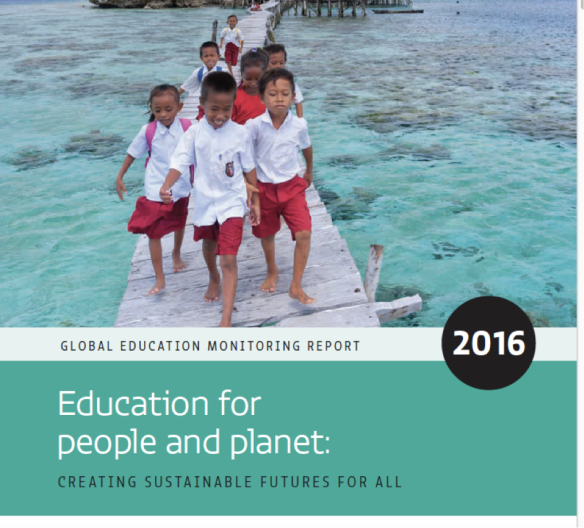Does the GEM 2016 report signify a change from the dominant neo-liberal agenda that sees education as an extension and a driver of the globalizing economy and the its push for infinite growth, innovation and expansion?
In a recent interview for EurActive.com Environmental Education Professor and a dear colleague and critical friend of mine already for many years, Lucy Sauvé from Quebec, sees in the GEM 2016 report more evidence that there is no substantial change in the ‘language’ of the latest UN Report on education and sustainable development. She cherry picks some statements from the report to illustrate this. I agree, there are some or even many cherries to pick with a neo-liberal flavour. But I can also pick cherries with a different flavour – a flavour that was completely or mostly absent in the UN ESD world.

I have both worked with the UNESCO DESD and the Global Education Monitor Team which operates separate from the DESD – even though it is located on the same floor in the UNESCO headquarters as the ESD-team – indeed as a critical friend in the sense that I am sympathetic to any attempt that can re-orient education towards planet and people, but that I am also cautious of co-optation of such efforts by that same neoliberal agenda.
So when I read about People-Planet-Profit (as the GEM team used initially) then I must ask ‘who or what got the P for Profit in there?’ Why not just People and Planet? If you need to have something more explicitly related to economy in there, then let us at least use the P of Prosperity.
When I read that education for all is important for all, because it will lead to economic development which is prerequisite for ecological and environmental sustainability then this logic must be questioned: is education there to serve the economy first and foremost? Is all education by definition good or can it be highly problematic? Etc.
When the ‘world of business’ jumps on the sustainable development, sustainability and ‘green’ bandwagon, then we must look critically at what the underlying motives are and what their efforts really entail. A car company promoting its hydride car using ‘sustainable excitement’ as its slogan, while at the same time manipulating its emission tests, needs to be questioned. Critical thinking is essential and asking disruptive questions is a part of that.
When we read about sustainable development we must also ask ‘must we always develop?’ Or can sustainability represent an alternative TO development? When we read UN DESD documents or the GEM2016 report we must also ask are there any references to ethics? the non-human world? Indigenous ways of knowing and being in the world? Etc.
Of course it is always easier to critique than it is to transform. Being near or within UNESCO circles I feel can have more impact in changing the dominant discourse than staying outside of it by raising the above questions from within in dialogue. Sure the UN is an enormous bureaucracy that doesn’t change overnight, but change does happen.
Working with the GEM Team for about 5 months has given me some insights in how such a comprehensive report is written: framing of the key issues, commissioning papers to mostly external experts, carefully selecting, re-organising and editing texts, distilling key messages as GEM reports are message-oriented, creating a coherent grand document, several rounds of ‘fact-checking’ and copy-editing.
The initial framing and the choice of experts who are to write about the key issues has a huge influence on the tone and direction of the narrative. When I came in, half a year before the report had to be finalized, the framing had been done and could not be changed much really (the thematic section, that I was involved in, is framed around 6 Ps: Planet, Prosperity, People, Places, Participation and Partnerships, whereas the second part of the report, the monitoring part, is framed around SDG 4 (Education) and 17 (Partnerships).
Where I could still have some influence was the tone and direction of the narrative, tweaking it towards a more critical perspective on the role of education and the current economy – with regards to gender, equity, indigenousness and participation the people from the GEM team working on those sections already had a rather critical perspective.
I should point out that initially I was surprised that the framing and selecting of experts was done without any consultation of the UNESCO ESD section. I asked the GEM Team why there was no or little interaction between the two sections. The response was that the Team wanted to write a more evidence-based report not using a potentially too rosy ESD lens but using a sober education lens to get a more accurate picture of the role of education in creating more sustainable futures for all. I also checked with the ESD section if this annoyed them but they were not. In fact they welcomed such an ‘independent’ attempt and hope it would lead to new insights and bring in new and more people into the conversation.
Now back to the initial question of this post: Does the GEM 2016 report signify a change from the dominant neo-liberal agenda that sees education as an extension and a driver of the globalizing economy and the its push for infinite growth, innovation and expansion?
If you are looking for confirmation of replication and affirmation of this agenda you will find it – as Lucy did, however, if you look for a shift in the common discourse, you will also find it. Below I have done some cherry-picking of my own by selecting some key messages that I think represent a counter narrative and a potential shift away from business as usual. Here are my cherries from the GEM2016 report, and believe me, some of them are quite radical and signify a departure form standard UN rhetoric:
- Current models of economic growth cause environmental destruction
- For education to be transformative in support of the new sustainable development agenda, ‘education as usual’ will not suffice.
- Education cannot fight inequality on its own. Labour markets and governments must not excessively penalize lower income individuals. Cross sectoral cooperation can reduce barriers to gender equality.
- A whole-school approach is needed to build green skills and awareness. Campaigns, companies, as well as community and religious leaders must advocate for sustainability practices. Non-formal education and research and development should also help solve global environmental challenges.
- Expand education on global citizenship, peace, inclusion and resilience to conflict. Emphasize participatory teaching and learning especially in civic education. Invest in qualified teachers for refugees and displaced people, and teach children in their mother language. Incorporate education into the peacebuilding agenda.
- Distribute public resources equitably in urban areas, involving the community in education planning.
- Mobilize domestic resources, stop corporate tax evasion and eliminate fossil fuel subsidies to generate government revenue for fundamental needs such as education and health.
- Include education in all discussions on urban development. Improve and fund urban planning programmes and curricula to include cross-sector engagement and develop locally-relevant solutions.
- Promote the value of indigenous livelihoods, traditional knowledge and community-managed or -owned land through actions such as land conservation and locally relevant research.
- Engage community elders in curricular development and school governance, produce appropriate learning materials and prepare teachers to teach in mother languages.
- Incentivize universities to produce graduates and researchers who address large-scale systemic challenges through creative thinking and problem-solving.
- Promote cooperation across all sectors to reduce policy-related obstacles to full economic participation by women or minority groups, as well as discrimination and prejudice that also act as barriers.
- Support multistakeholder governance for the sustainable management of natural resources and of public and semi-public rural, urban and peri-urban spaces.
But there’s more – the GEM2016 has a somewhat different take on Sustainable Development than previous UN reports recognizing that there are different perspectives, including ones that critique the notion of continuous development (the quote below comes form page 4 of the report):
‘The different perspectives of sustainable development include viewing it as a model to improve current systems (endorsed by those focusing on viable economic growth), a call for major reforms (supported by those who advocate for a green economy and technological innovation) and an imperative for a larger transformation in power structures and embedded values of society (supported by transition movements). Some ecologists, such as deep ecologists, believe present-day human development focuses too much on people and ignores the plant, animal and spiritual parts of this world (Leonard and Barry, 2009). They believe humans must learn to be less self-interested and place the needs of other species alongside their own. Transformation advocates say societies should go back to ways of living that are locally sustainable – consuming and wasting less, limiting needs to locally available resources, treating nature with respect, and abandoning polluting technology that has become an integral part of modern society. Culture advocates believe sustainable living can happen only if communities truly embrace it as part of daily culture (Hawkes, 2001) so that it affects decisions about what to eat, how to commute to work and how to spend leisure time.
The South American buen vivir movement rejects development as materialistic and selfish, implying that living sustainably means finding alternatives to development (Gudynas, 2011). The buen vivir belief system comes directly from traditional values of indigenous people, and posits that collective needs are more important than those of the individual. In Ecuador, this concept is called sumak kawsay, the Quechua term for fullness of life in a community. It involves learning to live within boundaries, finding ways to reduce use or to do more with less, and exploring non-material values. Ecuador and the Plurinational State of Bolivia have incorporated buen vivir into their constitutions.
Most definitions of sustainable development challenge the status quo, believing human development lacks meaning without a healthy planet. This view requires people, communities and nations to reconsider basic values of daily living and change the way they think. Understanding one’s own values, the values of one’s community and society, and those of others around the world is a central part of educating for a sustainable future. This means education systems need to continuously evolve and change in order to identify what practices work best within a given context and how they need to change over time. Indeed, for many of its advocates in education, sustainable development is best understood as a journey, rather than a destination.’
So in short – yes it is easy to critique this report as an extension of hegemonic globalizing thinking and as another attempt to hijack any efforts to change the dominant discourse, but I think that is too easy and not very generative. Rather I would look for the elements that represent a potential shift and a transition towards alternatives and help amplify them by highlighting and sharing them. Some of the texts above would have been unthinkable in mainstream UN-speak only 10 years ago. The glass is half full, not half empty this time.
Arjen Wals, September 14th, 2016





